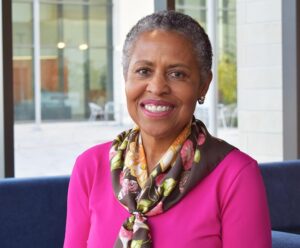December 15, 2020
As part of our mission to seek simple, scalable solutions to health care, Ariadne Labs holds regular innovation meetings to bring together our community of researchers and innovators seeking to produce discoveries that make care better. In November, Dr. Jewel Mullen, MD, MPH, MPA, spoke virtually to the Ariadne research community about the importance of equity and inclusion in public health.
 Dr. Mullen is an internist, epidemiologist, public health expert and the former Principal Deputy Assistant Secretary for Health in the U.S. Department of Health and Human Services. Her career has spanned clinical, research, teaching, and administrative roles. Currently, as the Associate Dean for Health Equity at Dell Medical School, Dr. Mullen works to influence, partner with, and build linkages to people and institutions in Dell and throughout the community to advance health equity, which she defines as “when everyone has the opportunity to be as healthy as possible.”
Dr. Mullen is an internist, epidemiologist, public health expert and the former Principal Deputy Assistant Secretary for Health in the U.S. Department of Health and Human Services. Her career has spanned clinical, research, teaching, and administrative roles. Currently, as the Associate Dean for Health Equity at Dell Medical School, Dr. Mullen works to influence, partner with, and build linkages to people and institutions in Dell and throughout the community to advance health equity, which she defines as “when everyone has the opportunity to be as healthy as possible.”
Reared in the relatively diverse city of New Rochelle, New York, Dr. Mullen was fascinated by science and math growing up and encouraged by her parents to “see the big picture” of society. She attended Yale University but can still recall the freshman counselor who told her she didn’t have to be a doctor; she was good at English, she could be an English teacher.
During her presentation, Dr. Mullen stressed the difference between equity and equality and warned about focusing on the social determinants of health rather than the part of health that can be affected by medical or health care. “We’ve almost learned to tell ourselves and to even teach our students how to externalize accountability for improving health,” she said. “We have sort of a blind spot about the disparities” in the care that medical and health professionals give.
We recently caught up with Dr. Mullen for an interview after her Ariadne Labs talk. The following Q & A has been edited and condensed.
Q: Why did you change careers from being a practicing physician to working in public health?
A: The desire to have more impact for more people. There’s nothing like the doctor-patient relationship, but one-on-one care is not going to improve care for society and in systems. I’m a systems person, so I thought I could take what I’d learned and be able to represent a new perspective on improving health. Some of my patients, as I said sad goodbyes, said to me ‘We need you to do this for us.” When systems are failing them, people need to believe there are leaders who are actually working on their behalf.
Q: In your presentation, you spoke of distinguishing between equity and equality. Could you elaborate?
A: Who doesn’t want to think that they’re a fair person who treats everyone well? Sometimes there is a mental shortcut: “Of course, I believe in equity. I treat everybody equally.” Equity isn’t about giving everybody the same thing. Equity is about giving everybody the opportunity to get to the same outcomes. Getting to those outcomes could mean that some people may need things that are different from what other people need.
Q: Can you explain how health professionals should shift their focus vis a vis social determinants of health and clinical medical care?
A: I know how important social determinants are. But we need to focus a little bit more over here on the medical care side. If you really are driving equity, then you’re also decreasing disparities in the medical care you deliver. If you’re not looking to see if those differences exist then, you’re fooling yourself to believe you’re really fixing them.
Q: You consider yourself nonpartisan. Yet today health has become such a partisan issue. Can we make health care less partisan?
A: Yes. If you take self-interest out of it. We need leaders who won’t avoid tough decisions because they don’t want to make constituents angry. Real service leadership isn’t about serving oneself to stay in one’s role. And we really don’t have to wait for a single leader. All of us can do something to advance health equity.


